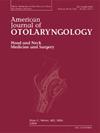免疫功能低下儿童急性侵袭性真菌性鼻窦炎的治疗:一篇叙述性综述
IF 1.7
4区 医学
Q2 OTORHINOLARYNGOLOGY
引用次数: 0
摘要
目的回顾免疫功能低下儿童急性侵袭性真菌性鼻窦炎(AIFR)治疗的现有证据。材料与方法系统检索PubMed、Embase和Cochrane Library。对儿童AIFR的流行病学、临床表现、诊断工具和治疗方法进行了叙述总结和批判性分析。结果免疫功能低下儿童的AIFR治疗非常具有挑战性,因为症状少且疾病进展迅速。以下关键概念对优化管理至关重要:1)通过临床特征(鼻窦、口腔、眼部、神经系统症状和发烧)和仪器检查(鼻内镜活检、微生物检查、CT和MRI)进行早期诊断;2)与手术治疗(内窥镜/开放)相关的有力药物抗真菌治疗;3)通过提高免疫能力来治疗潜在的免疫抑制;4)密切随访,发现复发及时干预。结论免疫功能低下儿童的aifr是一种罕见但严重的疾病,需要使用快速精确的方法来支持临床医生对其进行管理。从这个角度来看,多学科的诊断和治疗方法是必不可少的。然而,死亡率仍然很高,需要进一步研究以提高这一领域的知识。本文章由计算机程序翻译,如有差异,请以英文原文为准。
Management of acute invasive fungal rhinosinusitis in immunocompromised children: a narrative review
Objective
The aim is to review the current evidence for the management of acute invasive fungal rhinosinusitis (AIFR) in immunocompromised children.
Material and methods
A systematic search of PubMed, Embase, and Cochrane Library was performed. Data regarding the epidemiology, clinical presentation, diagnostic instruments, and treatments of pediatric AIFR were narratively summarized and critically analyzed.
Results
The management of AIFR in immunocompromised children can be very challenging because of the paucity of symptoms and rapidly progressive disease. The following key concepts are crucial to optimize the management: 1) early diagnosis through clinical features (sinonasal, oral, ocular, neurological symptoms and fever) and instrumental exams (nasal endoscopy with biopsy, microbiological tests, CT and MRI); 2) vigorous medical antifungal therapy associated with surgical treatment (endoscopic/open); 3) treat the underlying immunosuppression by improving immunocompetence; 4) close follow-up and prompt intervention in case of recurrence.
Conclusion
AIFR in immunocompromised children is a rare but serious condition that requires the use of fast and precise methods that can support clinicians in its management. In this perspective, a multidisciplinary diagnostic and therapeutic approach is essential. However, mortality is still high and further research is needed to improve knowledge in this field.
求助全文
通过发布文献求助,成功后即可免费获取论文全文。
去求助
来源期刊

American Journal of Otolaryngology
医学-耳鼻喉科学
CiteScore
4.40
自引率
4.00%
发文量
378
审稿时长
41 days
期刊介绍:
Be fully informed about developments in otology, neurotology, audiology, rhinology, allergy, laryngology, speech science, bronchoesophagology, facial plastic surgery, and head and neck surgery. Featured sections include original contributions, grand rounds, current reviews, case reports and socioeconomics.
 求助内容:
求助内容: 应助结果提醒方式:
应助结果提醒方式:


